Mindfulness Quotes
Most popular mindfulness quotes
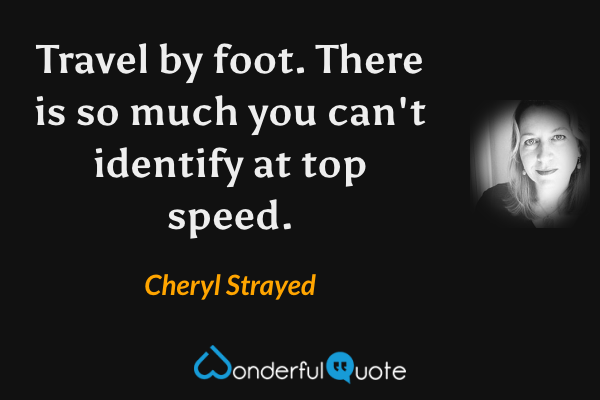
Travel by foot. There is so much you can't identify at top speed.

It isn't too late. Time is not running out. Your life is here and now. And the moment has arrived at which you're finally ready to change.
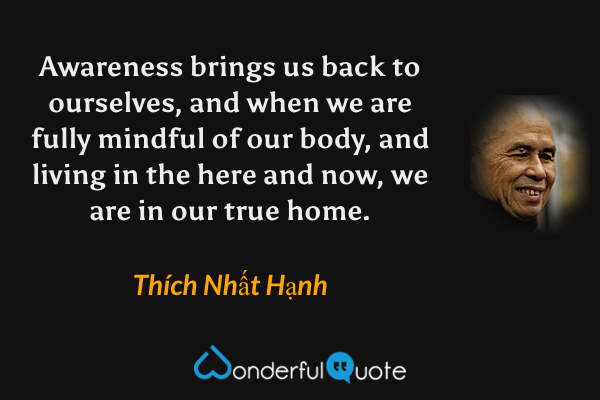
Awareness brings us back to ourselves, and when we are fully mindful of our body, and living in the here and now, we are in our true home.
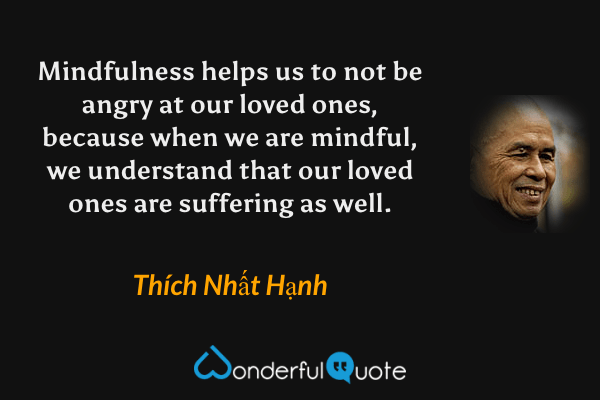
Mindfulness helps us to not be angry at our loved ones, because when we are mindful, we understand that our loved ones are suffering as well.
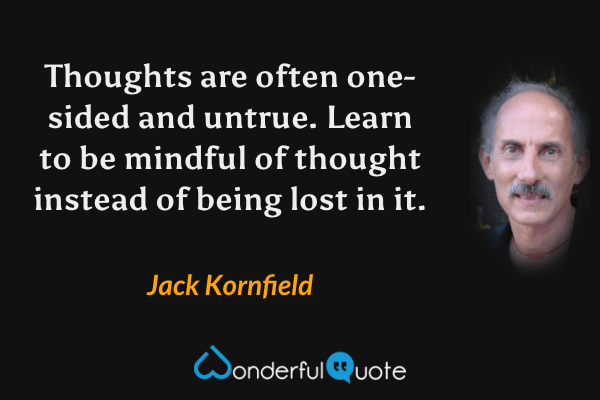
Thoughts are often one-sided and untrue. Learn to be mindful of thought instead of being lost in it.
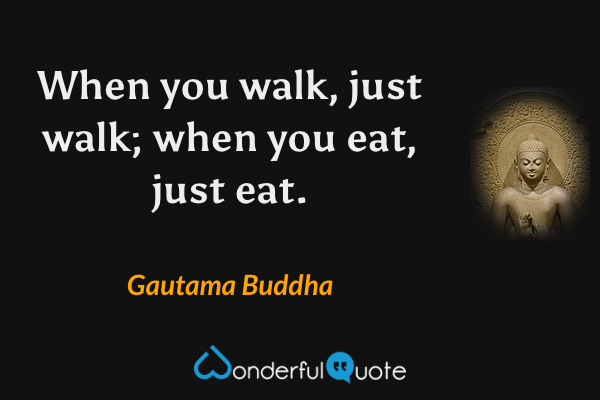
When you walk, just walk; when you eat, just eat.
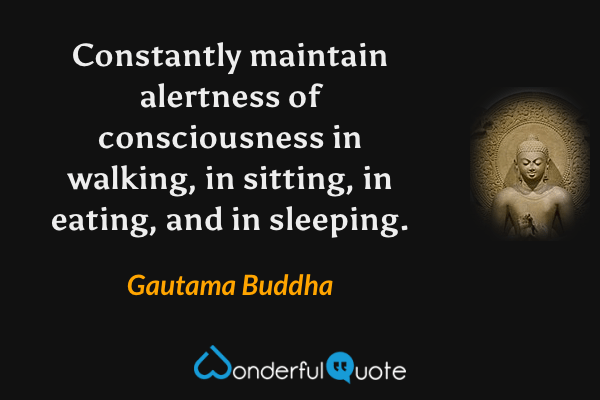
Constantly maintain alertness of consciousness in walking, in sitting, in eating, and in sleeping.
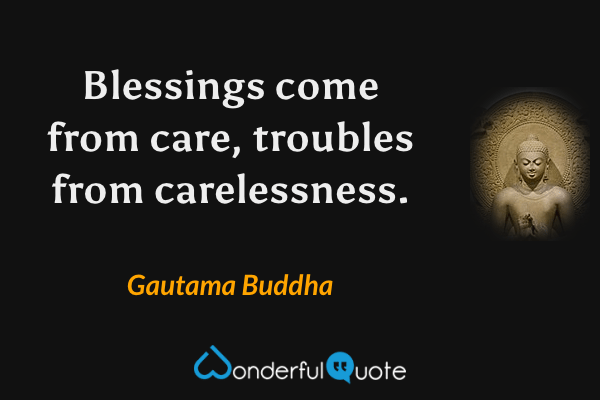
Blessings come from care, troubles from carelessness.
Life is so short we must move very slowly.
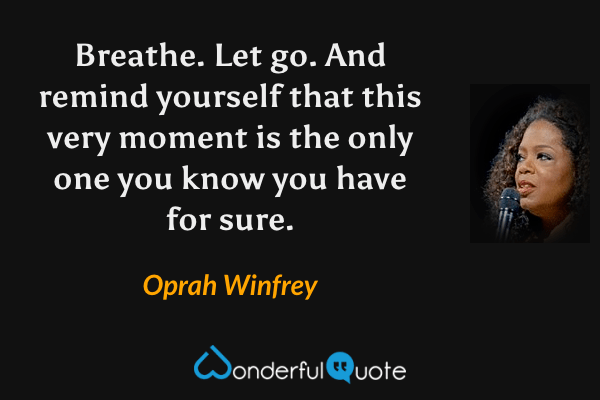
Breathe. Let go. And remind yourself that this very moment is the only one you know you have for sure.
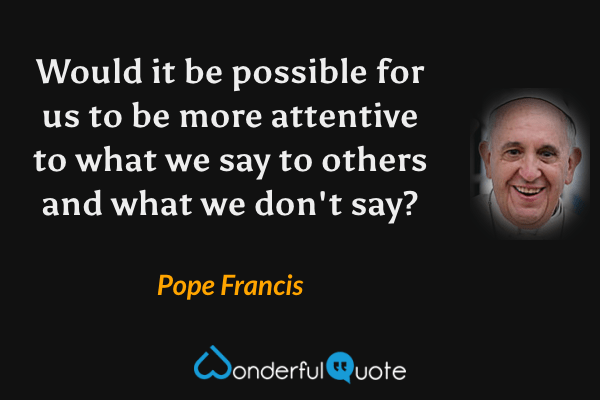
Would it be possible for us to be more attentive to what we say to others and what we don't say?
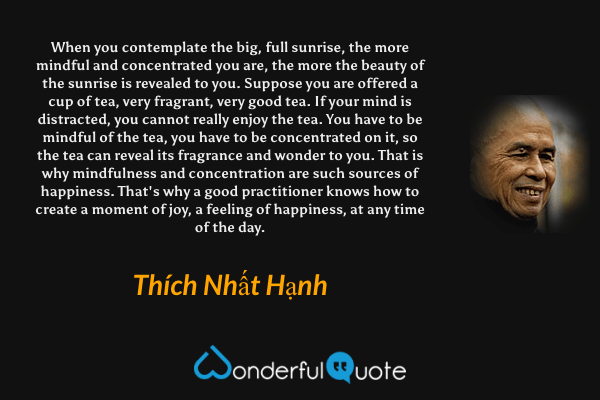
When you contemplate the big, full sunrise, the more mindful and concentrated you are, the more the beauty of the sunrise is revealed to you. Suppose you are offered a cup of tea, very fragrant, very good tea. If your mind is distracted, you cannot really enjoy the tea. You have to be mindful of the tea, you have to be concentrated on it, so the tea can reveal its fragrance and wonder to you. That is why mindfulness and concentration are such sources of happiness. That's why a good practitioner knows how to create a moment of joy, a feeling of happiness, at any time of the day.
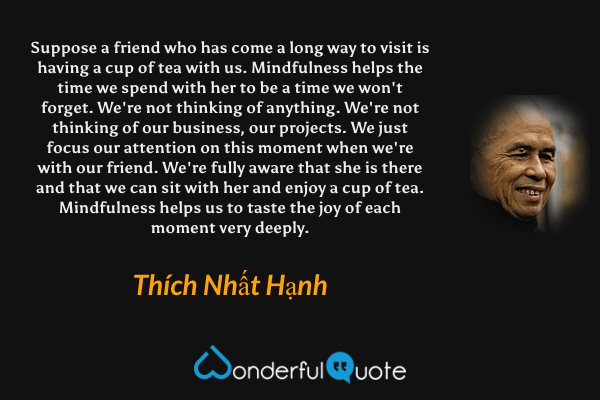
Suppose a friend who has come a long way to visit is having a cup of tea with us. Mindfulness helps the time we spend with her to be a time we won't forget. We're not thinking of anything. We're not thinking of our business, our projects. We just focus our attention on this moment when we're with our friend. We're fully aware that she is there and that we can sit with her and enjoy a cup of tea. Mindfulness helps us to taste the joy of each moment very deeply.
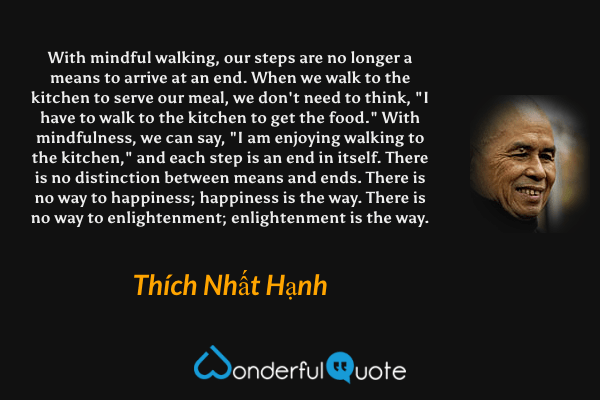
With mindful walking, our steps are no longer a means to arrive at an end. When we walk to the kitchen to serve our meal, we don't need to think, "I have to walk to the kitchen to get the food." With mindfulness, we can say, "I am enjoying walking to the kitchen," and each step is an end in itself. There is no distinction between means and ends. There is no way to happiness; happiness is the way. There is no way to enlightenment; enlightenment is the way.
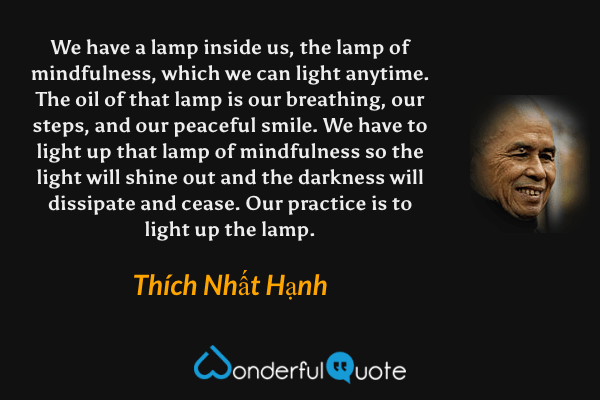
We have a lamp inside us, the lamp of mindfulness, which we can light anytime. The oil of that lamp is our breathing, our steps, and our peaceful smile. We have to light up that lamp of mindfulness so the light will shine out and the darkness will dissipate and cease. Our practice is to light up the lamp.
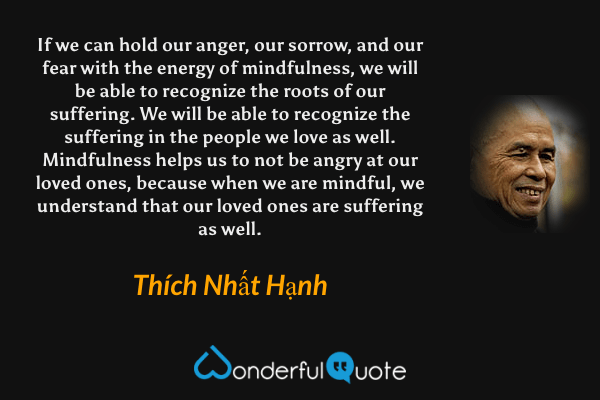
If we can hold our anger, our sorrow, and our fear with the energy of mindfulness, we will be able to recognize the roots of our suffering. We will be able to recognize the suffering in the people we love as well. Mindfulness helps us to not be angry at our loved ones, because when we are mindful, we understand that our loved ones are suffering as well.
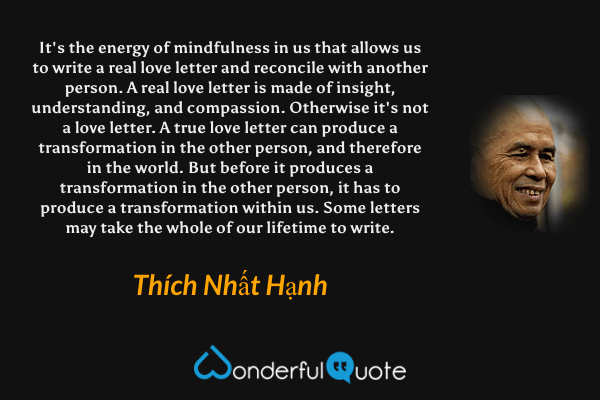
It's the energy of mindfulness in us that allows us to write a real love letter and reconcile with another person. A real love letter is made of insight, understanding, and compassion. Otherwise it's not a love letter. A true love letter can produce a transformation in the other person, and therefore in the world. But before it produces a transformation in the other person, it has to produce a transformation within us. Some letters may take the whole of our lifetime to write.
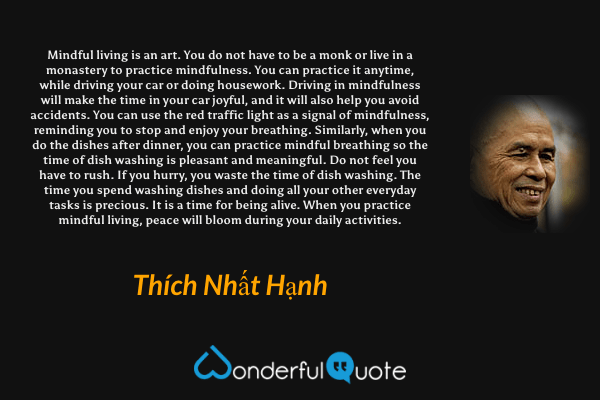
Mindful living is an art. You do not have to be a monk or live in a monastery to practice mindfulness. You can practice it anytime, while driving your car or doing housework. Driving in mindfulness will make the time in your car joyful, and it will also help you avoid accidents. You can use the red traffic light as a signal of mindfulness, reminding you to stop and enjoy your breathing. Similarly, when you do the dishes after dinner, you can practice mindful breathing so the time of dish washing is pleasant and meaningful. Do not feel you have to rush. If you hurry, you waste the time of dish washing. The time you spend washing dishes and doing all your other everyday tasks is precious. It is a time for being alive. When you practice mindful living, peace will bloom during your daily activities.
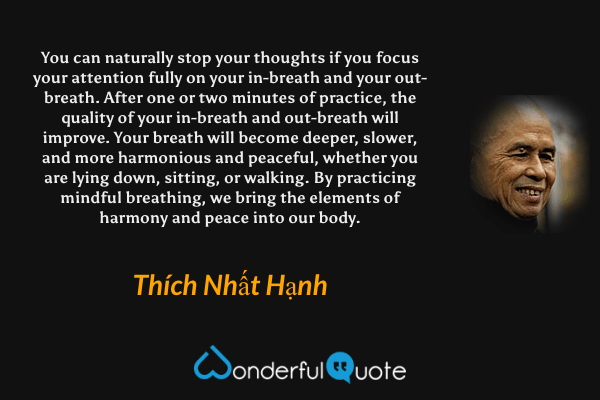
You can naturally stop your thoughts if you focus your attention fully on your in-breath and your out-breath. After one or two minutes of practice, the quality of your in-breath and out-breath will improve. Your breath will become deeper, slower, and more harmonious and peaceful, whether you are lying down, sitting, or walking. By practicing mindful breathing, we bring the elements of harmony and peace into our body.
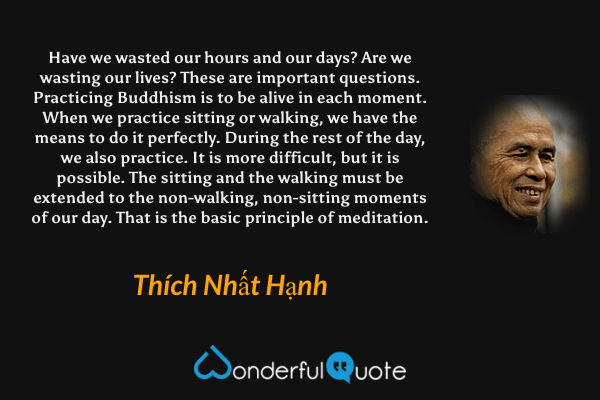
Have we wasted our hours and our days? Are we wasting our lives? These are important questions. Practicing Buddhism is to be alive in each moment. When we practice sitting or walking, we have the means to do it perfectly. During the rest of the day, we also practice. It is more difficult, but it is possible. The sitting and the walking must be extended to the non-walking, non-sitting moments of our day. That is the basic principle of meditation.
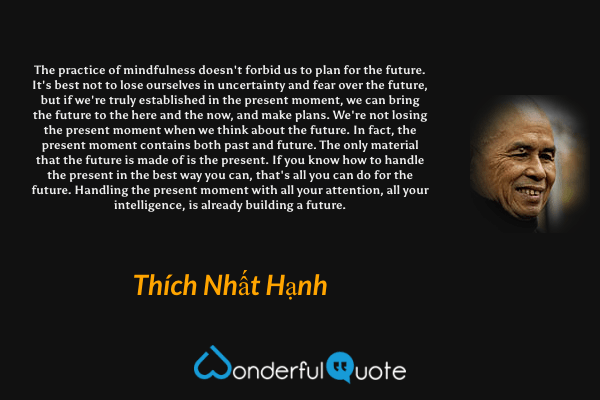
The practice of mindfulness doesn't forbid us to plan for the future. It's best not to lose ourselves in uncertainty and fear over the future, but if we're truly established in the present moment, we can bring the future to the here and the now, and make plans. We're not losing the present moment when we think about the future. In fact, the present moment contains both past and future. The only material that the future is made of is the present. If you know how to handle the present in the best way you can, that's all you can do for the future. Handling the present moment with all your attention, all your intelligence, is already building a future.
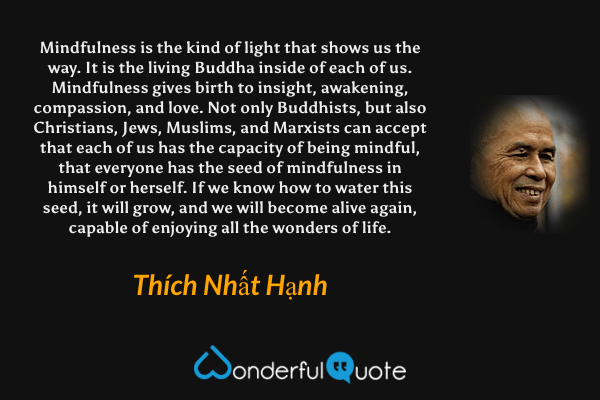
Mindfulness is the kind of light that shows us the way. It is the living Buddha inside of each of us. Mindfulness gives birth to insight, awakening, compassion, and love. Not only Buddhists, but also Christians, Jews, Muslims, and Marxists can accept that each of us has the capacity of being mindful, that everyone has the seed of mindfulness in himself or herself. If we know how to water this seed, it will grow, and we will become alive again, capable of enjoying all the wonders of life.
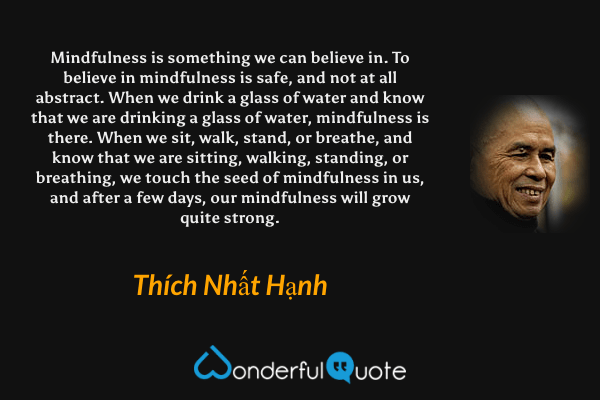
Mindfulness is something we can believe in. To believe in mindfulness is safe, and not at all abstract. When we drink a glass of water and know that we are drinking a glass of water, mindfulness is there. When we sit, walk, stand, or breathe, and know that we are sitting, walking, standing, or breathing, we touch the seed of mindfulness in us, and after a few days, our mindfulness will grow quite strong.
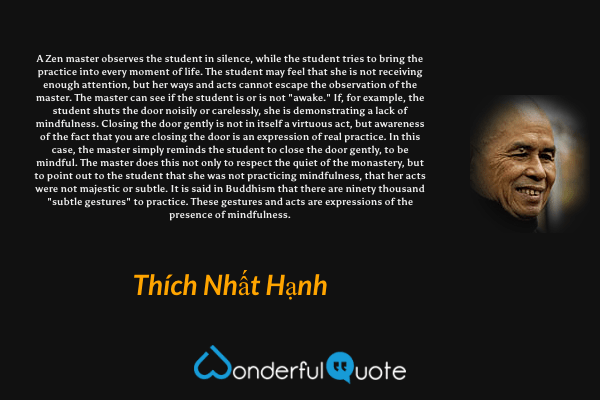
A Zen master observes the student in silence, while the student tries to bring the practice into every moment of life. The student may feel that she is not receiving enough attention, but her ways and acts cannot escape the observation of the master. The master can see if the student is or is not "awake." If, for example, the student shuts the door noisily or carelessly, she is demonstrating a lack of mindfulness. Closing the door gently is not in itself a virtuous act, but awareness of the fact that you are closing the door is an expression of real practice. In this case, the master simply reminds the student to close the door gently, to be mindful. The master does this not only to respect the quiet of the monastery, but to point out to the student that she was not practicing mindfulness, that her acts were not majestic or subtle. It is said in Buddhism that there are ninety thousand "subtle gestures" to practice. These gestures and acts are expressions of the presence of mindfulness.
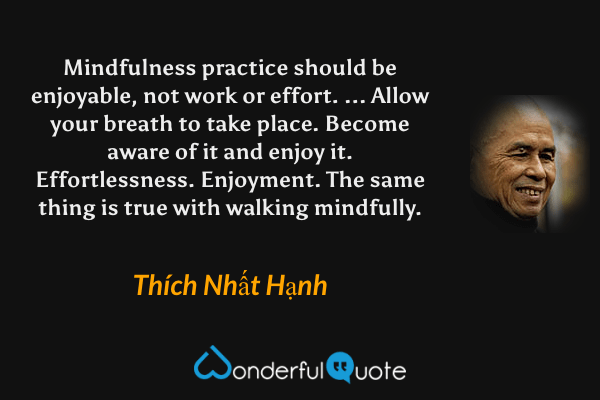
Mindfulness practice should be enjoyable, not work or effort. ... Allow your breath to take place. Become aware of it and enjoy it. Effortlessness. Enjoyment. The same thing is true with walking mindfully.
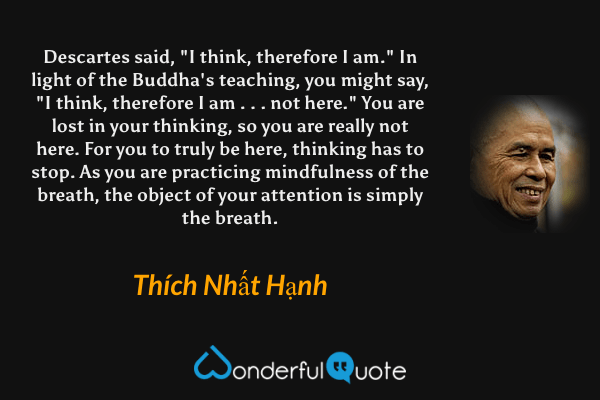
Descartes said, "I think, therefore I am." In light of the Buddha's teaching, you might say, "I think, therefore I am . . . not here." You are lost in your thinking, so you are really not here. For you to truly be here, thinking has to stop. As you are practicing mindfulness of the breath, the object of your attention is simply the breath.
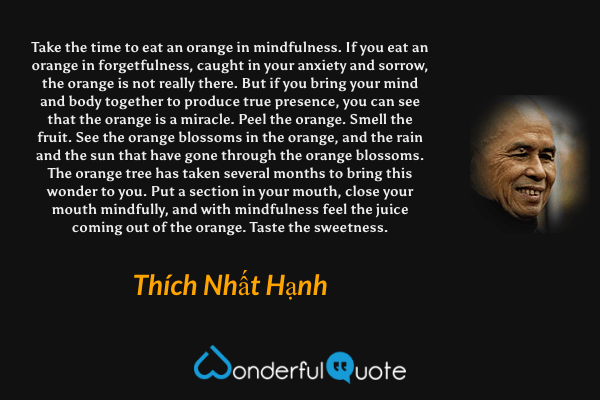
Take the time to eat an orange in mindfulness. If you eat an orange in forgetfulness, caught in your anxiety and sorrow, the orange is not really there. But if you bring your mind and body together to produce true presence, you can see that the orange is a miracle. Peel the orange. Smell the fruit. See the orange blossoms in the orange, and the rain and the sun that have gone through the orange blossoms. The orange tree has taken several months to bring this wonder to you. Put a section in your mouth, close your mouth mindfully, and with mindfulness feel the juice coming out of the orange. Taste the sweetness.
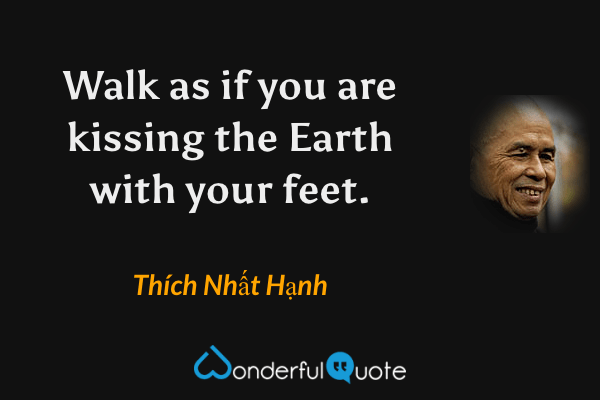
Walk as if you are kissing the Earth with your feet.
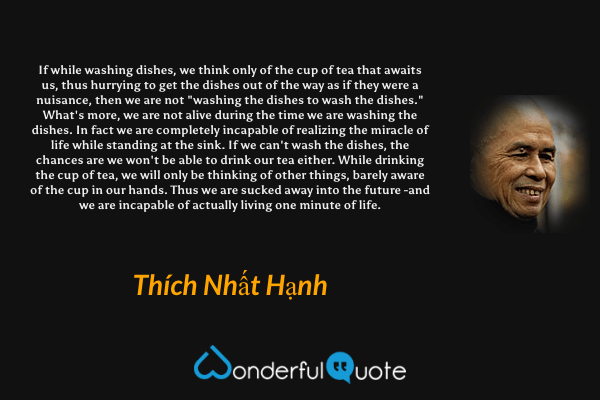
If while washing dishes, we think only of the cup of tea that awaits us, thus hurrying to get the dishes out of the way as if they were a nuisance, then we are not "washing the dishes to wash the dishes." What's more, we are not alive during the time we are washing the dishes. In fact we are completely incapable of realizing the miracle of life while standing at the sink. If we can't wash the dishes, the chances are we won't be able to drink our tea either. While drinking the cup of tea, we will only be thinking of other things, barely aware of the cup in our hands. Thus we are sucked away into the future -and we are incapable of actually living one minute of life.
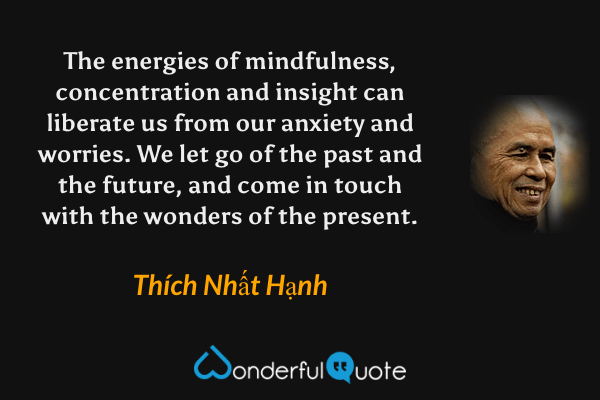
The energies of mindfulness, concentration and insight can liberate us from our anxiety and worries. We let go of the past and the future, and come in touch with the wonders of the present.

Concentrate every minute like a Roman—like a man—on doing what's in front of you with precise and genuine seriousness, tenderly, willingly, with justice. And on freeing yourself from all other distractions. Yes, you can—if you do everything as if it were the last thing you were doing in your life, and stop being aimless, stop letting your emotions override what your mind tells you, stop being hypocritical, self-centered, irritable.
Mindfulness gives you time. Time gives you choices. Choices, skillfully made, lead to freedom.


